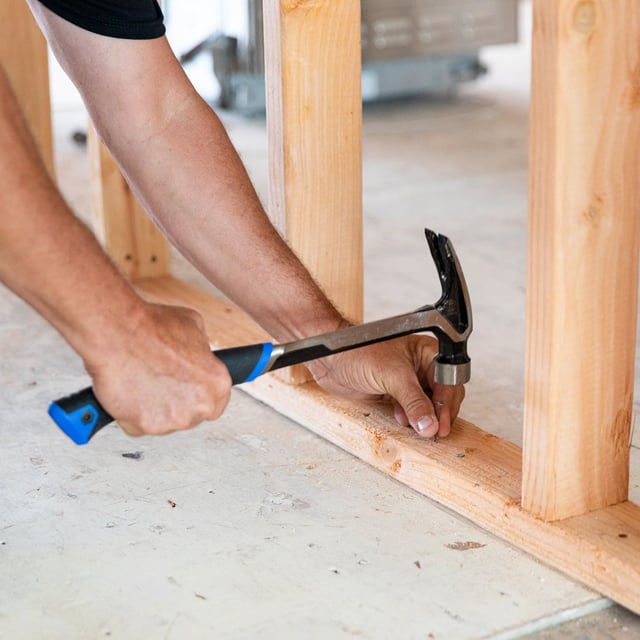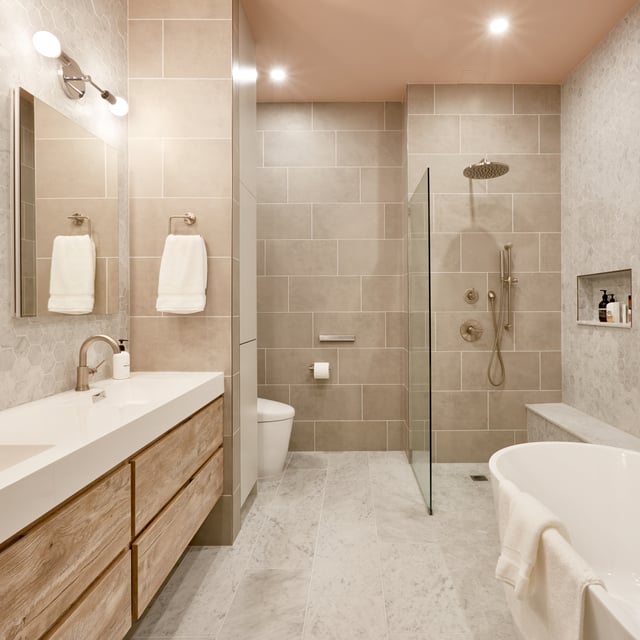
Cost
How Much Does a Bathroom Addition Cost?
09.26.2025


In This Article
Let's talk about renovation insurance — the unsung hero of any home makeover project. You might be dreaming of turning your bathroom into a spa oasis or transforming your kitchen into something straight out of Architectural Digest, but here's the thing: renovations can be risky business. From surprise mold colonies to overzealous contractors knocking down the wrong wall, things can (and do) go wrong. That's where renovation insurance, also called home renovation coverage or remodel insurance, swoops in to save the day.
In a nutshell, renovation insurance is a specialized policy designed to protect your home and wallet while work is underway. It covers mishaps, damage, and sometimes even those pesky delays. Why is it essential? Because your standard homeowner's policy likely won't cut it. Renovating without it is like juggling flaming torches without a safety net—exciting but not exactly smart. Let's dive into why you need it!
Renovation insurance is like a hard hat for your home during a remodel—essential and not just for looks. It's a specialized type of coverage designed to protect your property while construction crews, contractors, or even your DIY-enthusiast cousin get to work. Think of it as insurance for home remodeling, tailored to cover risks that pop up when your house is under construction.
There are a few types of policies rolled into renovation insurance. Builder's risk insurance covers damage to materials and the structure during the remodel (hello, busted windows or misplaced lumber). Liability insurance steps in if someone gets hurt on-site—because nobody wants a lawsuit over a rogue ladder. Depending on the scale of your project, construction coverage can also include protection for theft or vandalism. Renovation insurance is the safety net you didn't know you needed until a sledgehammer goes rogue.
Renovating your home is all fun and games until someone accidentally floods the basement—or worse, finds something expensive lurking behind the walls. While your Pinterest board may be filled with glossy "after" shots, getting to that point involves risks that can be as messy as the demo phase. This is why you need renovation insurance: to protect yourself, your property, and your wallet from the unexpected chaos of remodeling risks. Let's break it down.
Skipping renovation insurance is like driving without a seatbelt—sure, you might be fine, but why take the chance? Without it, you're on the hook for any accidents, damage, or delays that occur during construction. That contractor who accidentally knocks a hole into your neighbor's garage? You're liable. What about a sudden storm that soaks your new, half-finished roof? Yep, you're paying for that too. And don't forget theft—building materials are a hot target for sticky-fingered opportunists.
Even small remodels carry risks. Let's say a friend offers to help tile your bathroom (because they watched a YouTube tutorial). If they slip on a wet surface and injure themselves, guess who's legally and financially responsible? Without renovation insurance, it's you. Remodeling risks don't just ruin your day; they can wreak havoc on your bank account.
Now, let's flip the script. With renovation insurance, you're covered against these hiccups. It's like having a personal bodyguard for your home during its makeover. A good policy ensures you're not paying out-of-pocket for accidents, delays, or damage. If a contractor accidentally cuts through a pipe or a worker twists an ankle on your property, your coverage steps in to handle costs and liability.
Another big perk? Peace of mind. Renovation insurance lets you focus on making decisions about tile patterns and paint colors instead of worrying about how you'll afford to fix a mishap. Plus, with coverage in place, your contractors are often held to higher standards of accountability. They know you've dotted your i's and crossed your t's, so they're less likely to cut corners.
Here's the kicker: in some cases, renovation insurance isn't just a smart choice—it's the law. Many municipalities and lenders require proof of coverage before you can even start tearing down walls. For example, if you're financing your remodel through a construction loan, your lender will likely insist on builder's risk insurance. Similarly, local building codes might mandate liability coverage to issue permits.
Even if it's not legally required, some homeowner's associations and contractors won't touch your project unless they know you're covered. Think of it as an extra layer of credibility that says, "I've got this handled."
Ultimately, renovation insurance is your ultimate remodeling safety net. Don't start that project without it—or you might end up with more drama than HGTV.
When it comes to renovation insurance, there's no one-size-fits-all approach. Instead, you've got a variety of policies that tackle specific risks like a dream team of coverage superheroes. Whether it's protecting your property from damage, shielding you from liability, or beefing up your existing homeowner's policy, there's a type of renovation insurance to match your project. Let's break down the main players.
Think of builder's risk insurance as the VIP pass for your remodel—it covers the structure and materials during construction. Accidental fire? Covered. Storm damage? Covered. A clumsy contractor who sends drywall tumbling into your dining table? You guessed it—covered. This policy also extends to theft and vandalism because, unfortunately, piles of lumber and shiny new appliances can be irresistible to thieves.
But here's the catch: builder's risk insurance only lasts for the duration of your project. Once the renovation is complete, you'll need to transition your coverage back to a standard homeowner's policy. Still, it's an absolute must-have for protecting your investment while the work is in progress. Without it, you're footing the bill for any mishaps—yikes.
Picture this: A worker trips over a stray extension cord on your property and ends up with a sprained wrist—or worse, a full-blown lawsuit. Liability insurance for renovations covers medical bills and legal fees, saving you from dipping into your savings to cover someone else's slip-up.
This type of coverage is especially important if you're hiring independent contractors who don't have their own insurance. Even if they're pros at what they do, accidents happen. Liability insurance also protects you if someone outside the project gets hurt, like a neighbor wandering onto your property to "supervise." Trust us, it's worth the peace of mind.
If you thought your standard homeowner's insurance had your back during renovations, think again. Most policies don't automatically cover construction-related risks. That's where homeowner's policy extensions come in. These add-ons can provide additional coverage for specific scenarios, like damage caused by a contractor or increased liability during the remodel.
However, these extensions are usually limited in scope, so they're best for smaller projects like updating your kitchen backsplash or replacing a bathroom vanity. For major overhauls, builder's risk and liability insurance are more robust options. Still, a quick call to your insurance provider to discuss policy extensions is worth it—you might even score some savings by bundling your coverage.
The types of renovation insurance policies you need depend on the size and scope of your project. Builder's risk keeps your materials and structure safe, liability insurance protects you from costly accidents, and homeowner's policy extensions provide a little extra cushion for smaller jobs. Choose wisely—your future stress levels will thank you.
Renovation insurance works like a safety net, ready to catch you if things go sideways during your home remodel. Here's a quick breakdown of how it all comes together so you can focus on picking paint colors instead of stressing about surprise disasters.
Start by talking to your current insurance provider—sometimes, they can add coverage to your homeowner's policy. If that's not an option, shop around for specialized renovation insurance. Be ready to share details about your project, including timelines, budgets, and contractor info. Pro tip: make sure your contractors have their own insurance before signing anything.
If disaster strikes—like a burst pipe or a contractor accidentally smashing a window—take a deep breath. Document the damage with photos, contact your insurer ASAP, and file a claim. They'll assess the situation and determine coverage based on your policy.
Most renovation insurance covers accidental damage, theft, and liability for injuries on your property. However, pre-existing issues, poor workmanship, and natural wear-and-tear are usually excluded. Translation? You're covered for the unexpected but not for shoddy shortcuts.
Basically, renovation insurance keeps you protected when the unexpected happens—because no one wants to rebuild their budget and their house.
Renovation insurance won't cost you as much as a top-of-the-line kitchen remodel, but it's definitely an expense to factor into your budget. The price tag depends on a few variables, but let's break it down.
On average, renovation insurance can range from 1% to 5% of the total renovation project cost, depending on the scope of your project. A small bathroom makeover? You might pay on the lower end. Turning your attic into a fully livable space? Expect to be closer to the top. While it's not pocket change, it's a small price to pay for peace of mind when your home turns into a construction zone.
The cost of renovation insurance depends on the size of your project, its location, and how long the work will take. Bigger, longer projects naturally come with higher premiums. The type of policy you choose—like builder's risk versus liability insurance—also impacts the price. And don't forget to check whether your contractors are insured; if they aren't, you'll likely need to pay more to cover potential risks.
In short, while renovation insurance adds to your project costs, it saves you from footing massive unexpected bills later. Think of it as the safety goggles of home improvement—essential, even if you hope you'll never need it.
Choosing the right renovation insurance isn't as exciting as picking tile patterns or paint colors, but it's arguably more important. The wrong policy—or worse, no policy at all—can turn your dream remodel into a financial nightmare. Here's how to ensure you're covered from all angles while keeping things stress-free.
Before diving into a policy, channel your inner detective and ask the right questions. First, what exactly does the insurance cover? Builder's risk insurance typically handles structural damage and material loss, but does it include things like theft or vandalism? Liability insurance may cover injuries on-site, but does it account for accidental damage to neighboring properties? You'll also want to know if there are exclusions for faulty workmanship or pre-existing issues.
Another key question: how long does the policy last? Renovation insurance is often temporary, ending when the project is complete. If your remodel timeline stretches longer than planned (and let's be honest, most do), can you extend the coverage? Lastly, ask about the claims process. Is it streamlined and efficient, or will you need to jump through endless hoops to get reimbursed?
Not all renovation insurance is created equal, so it's worth shopping around. Start by getting quotes from multiple providers to compare costs, coverage limits, and any add-ons that might be available. Look beyond price—while saving a few bucks might feel good now, a bare-bones policy could leave you high and dry if something goes wrong.
Pay attention to customer reviews and provider reputation. Are they known for quick claims processing and excellent customer support? Because when your contractor accidentally takes out a load-bearing wall, you'll want an insurer who picks up the phone on the first ring.
Tailor your choice to your project. A smaller, quick renovation might not require the same level of coverage as a major overhaul. Make sure the policy aligns with your specific needs so you're not paying for unnecessary extras or missing crucial protection.
Your contractor plays a big role in your renovation's success—and your insurance coverage. Before hiring anyone, confirm they carry their own liability and worker's comp insurance. If they don't, you could be on the hook for injuries or damage caused by their crew.
Even if your contractor is insured, you may still need to supplement their coverage with your own policy. For example, builder's risk insurance typically falls on the homeowner, not the contractor. Having both parties properly insured ensures no gaps in coverage—and a smoother renovation process.
Ultimately, the right renovation insurance acts as a financial safety net, letting you focus on the fun parts of remodeling without stressing about what-ifs. Take the time to ask questions, compare policies, and coordinate with your contractor to ensure your project is protected from start to finish. It's the best way to safeguard your investment—and your sanity.

Written by Block Renovation
What does renovation insurance typically cover?
Is renovation insurance mandatory for all home remodeling projects?
Can I use my regular homeowner's insurance for a renovation project?
What happens if my contractor damages my property during renovations?
How can I lower the cost of renovation insurance?

Renovate confidently with Block
Easily compare quotes from top quality contractors, and get peace of mind with warranty & price protections.
Thousands of homeowners have renovated with Block

4.5 Stars (100+)

4.7 Stars (100+)

4.5 Stars (75+)

Cost
How Much Does a Bathroom Addition Cost?
09.26.2025

Cost
Calculating the Cost of Your 12x24 Addition
09.18.2025

Cost
10x10 Bathroom Remodeling Costs
09.18.2025

Cost
The Average Cost of a Jacuzzi Bath Remodel—and How to Save
09.18.2025

Finance
With Lower Interest Rates, Is Now a Good Time to Renovate?
09.18.2025
Renovate confidently